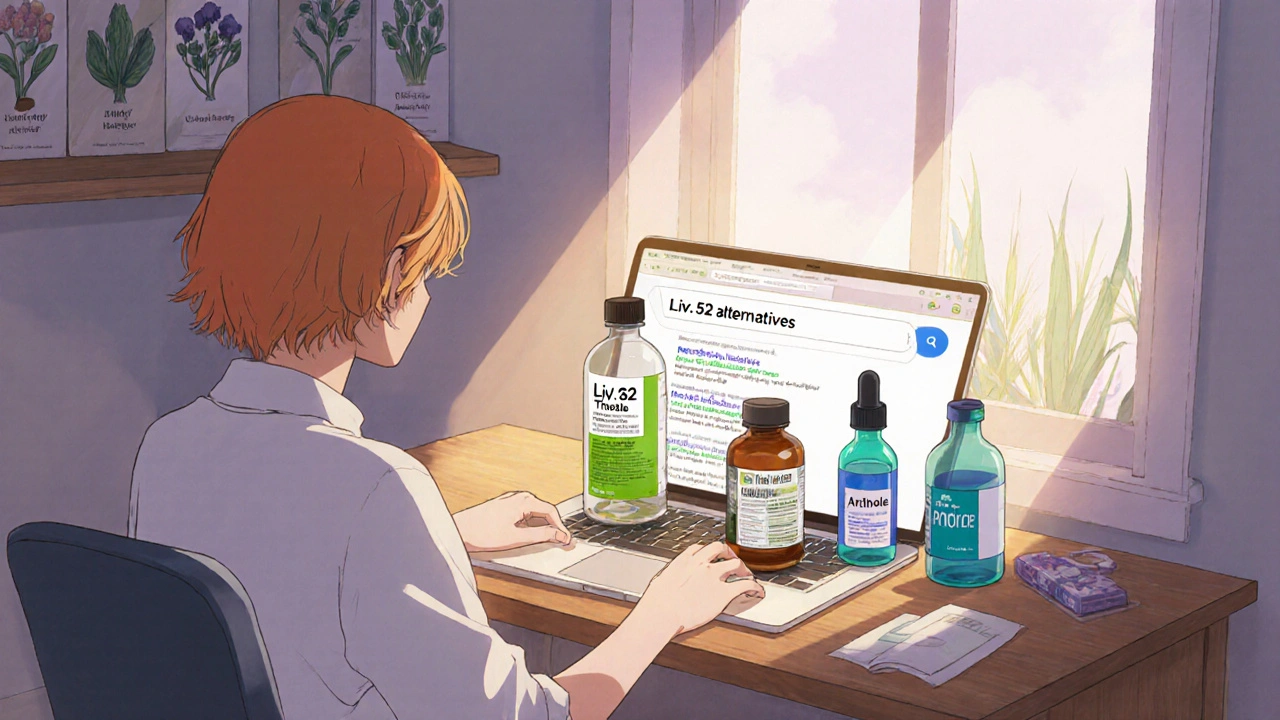Liv.52 Alternatives – Natural Liver Support Options
When looking for Liv.52 alternatives, herbal or dietary supplements that aim to protect and regenerate the liver, often used by people seeking a non‑pharmaceutical approach to liver health. Also known as Liv.52 substitutes, these products usually combine antioxidants, plant extracts, and vitamins to help the organ detoxify, repair cells, and reduce inflammation.
Key Herbal Players in Liver Care
One of the most cited options is Milk Thistle (Silybum marianum), a plant whose active component silymarin protects liver cells from toxins and promotes regeneration. Another popular choice is N‑Acetyl Cysteine (NAC), a precursor to glutathione, the body’s main antioxidant that supports detoxification pathways. Ursodeoxycholic Acid (UDCA), a bile acid that improves bile flow and reduces liver inflammation, is often prescribed alongside natural formulas. Each of these agents brings a distinct mechanism, yet they all share the goal of enhancing liver resilience.
Beyond these staples, supplements like Alpha Lipoic Acid act as a universal antioxidant, helping both fat‑soluble and water‑soluble environments in the liver. Turmeric’s curcumin adds anti‑inflammatory power, while Dandelion root offers mild diuretic effects that can aid in flushing out excess bilirubin. When you stack these ingredients, you create a multi‑layered defense that mirrors the broad‑spectrum approach of Liv.52.
Liv.52 alternatives encompass herbal formulas, amino‑acid precursors, and mineral complexes. Effective liver support requires antioxidants to neutralize free radicals, bile‑acid regulators to keep flow smooth, and anti‑inflammatory agents to calm tissue irritation. Lifestyle choices—balanced diet, limited alcohol, regular exercise—directly influence how well these supplements work, so you’ll often see recommendations pairing the products with dietary tweaks.
For people with fatty liver disease, the combination of milk thistle and NAC has shown measurable reductions in liver enzymes in short‑term studies. Those dealing with alcohol‑related damage may benefit more from UDCA plus turmeric, which together target inflammation and bile stagnation. If you’re managing a medication‑induced liver strain, a blend featuring silymarin, alpha lipoic acid, and a small dose of SAM‑e can provide a protective shield while the liver recovers.
Choosing the right alternative hinges on your specific liver stressor. If oxidative stress is your main concern, prioritize NAC and silymarin. If bile flow is sluggish, add UDCA or artichoke leaf extract. When inflammation dominates, turmeric and ginger become valuable allies. Understanding these nuances lets you customize a regimen that feels like a tailored treatment rather than a one‑size‑fits‑all bottle.
Cost and availability also matter. Milk thistle extracts are widely sold as capsules or tinctures and are usually affordable. NAC can be found in both prescription‑strength and over‑the‑counter forms, though quality varies. UDCA often requires a prescription, but generic versions keep prices reasonable. Checking for third‑party testing ensures you get the labeled potency without unwanted fillers.
Below you’ll find a broad collection of health articles ranging from medication comparisons to natural remedy guides. The mix reflects the diverse ways people address liver health, whether through supplements, diet, or lifestyle changes. Dive in to see how each piece fits into the bigger picture of supporting your liver without relying solely on Liv.52.

Liv.52 vs Top Liver Health Supplements: Detailed Comparison
A detailed comparison of Liv.52 with top liver health supplements, covering ingredients, benefits, side effects, cost and how to pick the right option for you.
